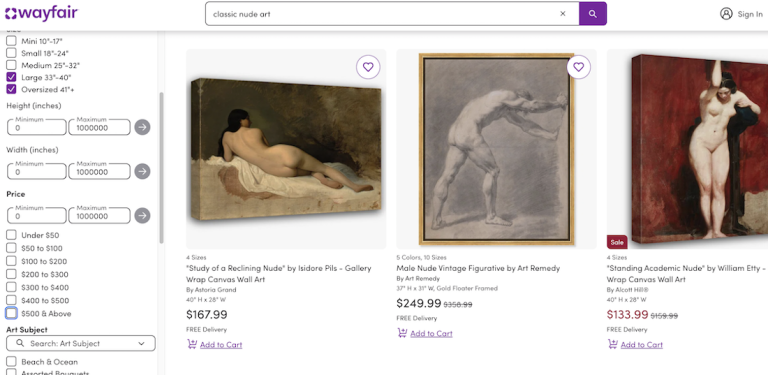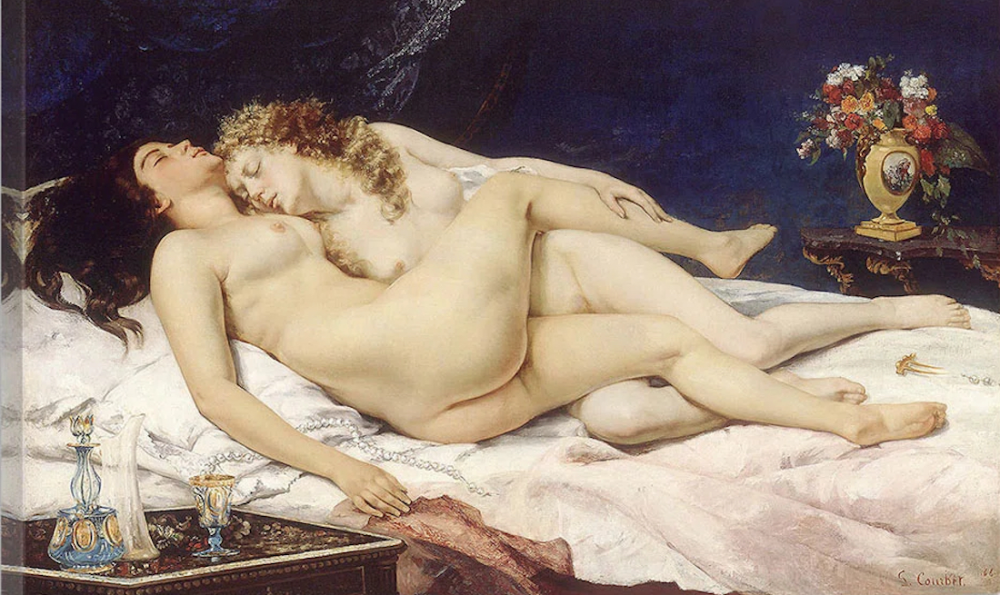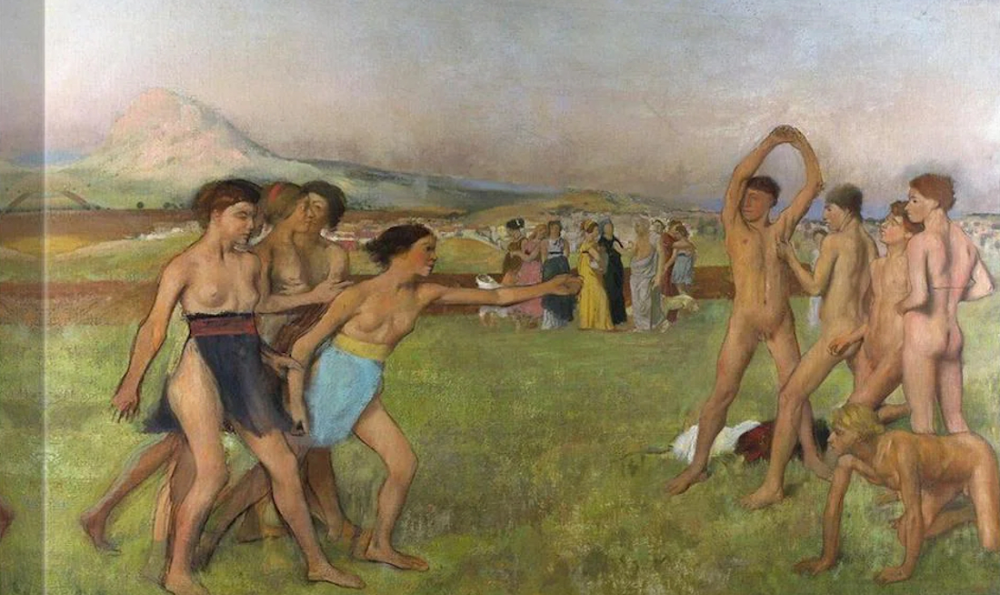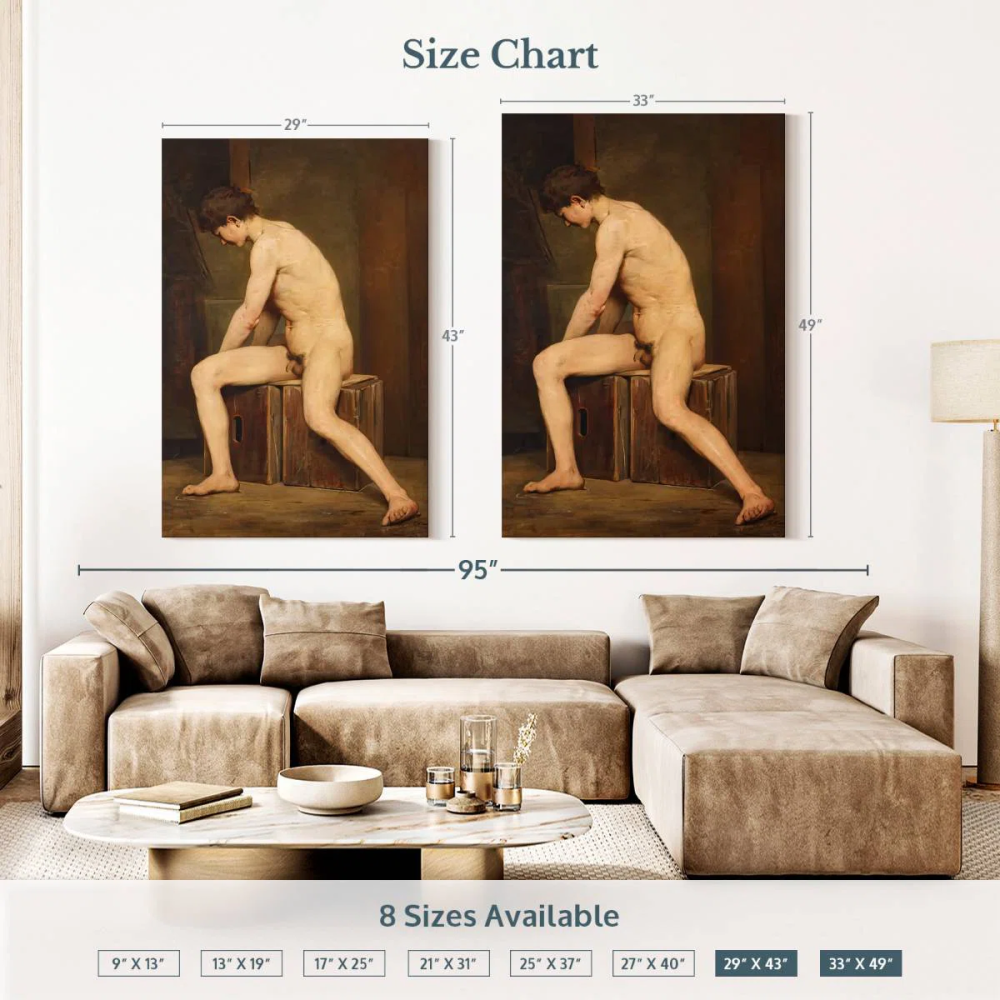

Amid Controversy Over Migrant Detention Ties, Retailer Sells Classical Nudes and Faces Scrutiny Over Moral Responsibility
New York, N.Y. — While Wayfair’s history of supplying furniture to migrant detention centers sparked outrage, the company’s lesser-known commerce in classical nude art—from Gustave Courbet to Edgar Degas—has drawn equal parts fascination and critique.
The retailer’s catalog includes reproductions of provocative works like Courbet’s Le Sommeil and Hans Canon’s A Reclining Male Nude, positioning itself as an unlikely purveyor of fine art to Middle America.
Absent modern provocateurs like Robert Mapplethorpe, Wayfair’s collection leans on 19th-century masters.
Among its offerings is Gustave Courbet’s Le Sommeil (1866), a painting depicting two women in an intimate embrace, long interpreted as a celebration of lesbian love. Similarly, Edgar Degas’ Young Spartans Exercising (1860)—a study of adolescent tension and ancient Spartan rituals—joins works by Hans Canon, a pseudonym for Austrian-Czech painter Johann Baptist Strašiřipka (1829–1885), whose classical style belied his short, impactful career.
From Degas to Detention Centers: A Corporate Contradiction
Kelly Clarkson’s Role in the Brand’s Public Image
Ambassador Kelly Clarkson, the Grammy-winning American Idol alum, amplifies Wayfair’s cheerful façade. Since 2020, she has curated home collections and starred in ads promoting the brand’s “empowering” vision. While Clarkson’s authenticity resonates with shoppers, her partnership sidesteps the ethical firestorm—a dissonance critics liken to “capitalism without conscience.”
Wayfair – It’s Just Capitalism
The retailer’s duality—enlightening consumers with art while profiting from detention centers—epitizes capitalism’s moral ambiguity. A search for “sex” on its site yields 48,441 results, from erotic art to adult toys, yet its stance on migrant rights remains transactional. As one critic noted, “This isn’t about art or furniture—it’s about whether corporations can ethically straddle exploitation and enlightenment.”

Classical Nudes Meet Modern Commerce: Wayfair’s Artistic Offerings


Gustave Courbet’s Le Sommeil Available to Middle America
The painting above, Le Sommeil (also known as “The Sleepers” or “The Dream”) by Gustave Courbet, was created in 1866. This masterpiece is famous for its depiction of two women in an intimate, sensual embrace, and is often interpreted as representing themes of lesbian love, indolence, and lust.
Relatively Unknown Master Hans Canon
“Hans Canon” was the pseudonym of Johann Baptist Strašiřipka (1829-85, Vienna), an Austrian history and portrait painter of Czech origin who died of a heart attack at the young age of 56.
Ethical Crossroads: Profits vs. Human Rights Concerns
The irony is stark: Wayfair profits from both high art and humanitarian crises.
In 2019, the company sold $200,000 worth of furniture to BCFS, a contractor operating migrant detention facilities in Texas.
Employees staged walkouts, demanding profits be redirected to groups like RAICES, a legal aid nonprofit.
Wayfair defended its actions as legally compliant, refusing to “politicize” orders. Critics, however, argue the company enables systemic suffering—a charge that shadows its cultural cachet.
From Degas to Detention Centers: A Corporate Contradiction
Founded in 2002, Wayfair operates as a drop-shipping behemoth, offering 14 million products from 11,000 suppliers.
This model allows niche items—like Francisco de Goya’s La maja desnuda, a portrait of a bold Madrid “maja” (a term blending charm and rebellion)—to sit alongside mass-produced goods.
Yet its apolitical veneer cracks under scrutiny: the same platform supplying dorm beds to detained migrant children sells Degas’ explorations of human form and freedom.

Edgar Degas’ Young Spartans Exercising
Young Spartans Exercising was painted by the French painter Edgar Degas around 1860.
The painting itself depicts two groups of Spartan youths-girls and boys-engaged in exercise or possibly a courtship ritual, based on interpretations of ancient texts by Plutarch.
Degas is considered a founder of Impressionism.
He was a prominent figure in the 19th century art world and is best known for his depictions of Parisian life, particularly ballet dancers.
Degas was fascinated by dancers and sought to capture their power and grace, often painting them backstage preparing for performances.

Francisco de Goya’s La maja desnuda
The backstory of Spain’s Francisco de Goya‘s La maja desnuda is perhaps more interesting than the painting itself.
“Naked” is easy, but “maja” more complicated. In Goya’s time, maja was a term used to describe a young, fashionable, often lower-class woman from Madrid, with a particular style and manner.
The term often connotes a pretty young woman who might be seen as a bit too forward or revealing in her attire.
The painting La maja desnuda by Goya (1746-1828, Madrid) hangs in the Museo del Prado in Madrid.

Kelly Clarkson’s Role in the Brand’s Public Image

Kelly Clarkson, the American singer, songwriter, and television personality who first became famous as the winner of the first season of American Idol, shills for Wayfair.
Clarkson, known for her charisma and authenticity, has been the company’s brand ambassador since 2020.
Her role includes starring in national advertising campaigns, collaborating on exclusive home collections inspired by her lifestyle and southern roots, and integrating Wayfair promotions into her daytime talk show, The Kelly Clarkson Show.
The partnership aims to “empower customers to create homes they love,” with Clarkson’s personality and style resonating strongly with Wayfair’s audience..
Ethical Crossroads: Profits vs. Human Rights Concerns
We applaud Wayfair’s selection of classical art — including “nude art” — for sale to the American public. With over 14 million items, much can be included (sex toys, etc.). In fact as search on its website for “sex” uncovers 48,441 items. That’s a lot or romance for Middle America.
At the end of the day, however amused we are at Wayfair’s role in enlightening American consumers to the human body, we are appalled at any corporation that profits from assisting the Trump administration’s efforts of wholesale migrant deportation, but acknowledge that capitalism has no moral base and this is ‘just business.’
Wayfair’s Art Sales Stir Debate on Corporate Ethics and Capitalism (May 19, 2025)
75-Word Audio Summary:
Wayfair’s sale of classical nude art, including works by Gustave Courbet and Edgar Degas, contrasts sharply with its 2019 sale of furniture to migrant detention centers. While the retailer defends its actions as standard commerce, critics argue it profits from human suffering. This duality highlights corporate ethics debates, amplified by brand ambassador Kelly Clarkson’s cheerful endorsements. Can companies balance capitalism with conscience? Explore the intersection of art, commerce, and morality.
#CorporateEthics #ArtAndCapitalism #WayfairControversy #MigrantRights
TAGS: Wayfair, corporate ethics, migrant detention, classical art, Kelly Clarkson,
capitalism, consumer activism, Hans Canon, Gustave Courbet
Social Media Blurbs
X/Twitter:
Wayfair’s Art Sales Stir Debate on Corporate Ethics and Capitalism. #CorporateEthics #WayfairControversy bit.ly/example
Bluesky:
From classical nudes to migrant detention ties, Wayfair’s ethics face scrutiny. Dive into the debate. #ArtAndCapitalism #Wayfair bit.ly/example
LinkedIn:
Wayfair’s dual role as a seller of classical art and contractor for migrant detention centers raises critical questions about corporate responsibility. With brand ambassador Kelly Clarkson in focus, how should businesses balance profit and ethics? Join the discussion. #CorporateEthics #ConsumerActivism #Wayfair www.stewardshipreport.org/wayfair-ethics
Truth Social:
Wayfair under fire for selling nude art while aiding migrant detention centers. Explore the controversy. #WayfairControversy bit.ly/example
Mastodon:
Wayfair’s sale of classical nudes sparks debate: Can corporations balance art commerce with ethical responsibility? Critics highlight ties to migrant detention centers. Join the conversation. #CorporateEthics bit.ly/example
Instagram:
🎨 Wayfair’s Art Sales Stir Debate on Ethics vs. Profit
Should companies balance commerce with conscience? Explore the clash.
#Wayfair #CorporateEthics #ArtAndCapitalism
Link in bio ➡️ bit.ly/example
Facebook:
Wayfair’s sale of classical nude art contrasts starkly with its role in furnishing migrant detention centers. How do corporations reconcile profit and ethics? Dive into the debate. #CorporateEthics #WayfairControversy www.stewardshipreport.org/wayfair-ethics
Reddit:
Can companies like Wayfair ethically balance selling art and aiding migrant detention centers? Critics argue profit trumps morality. What’s your take? #CorporateEthics bit.ly/example